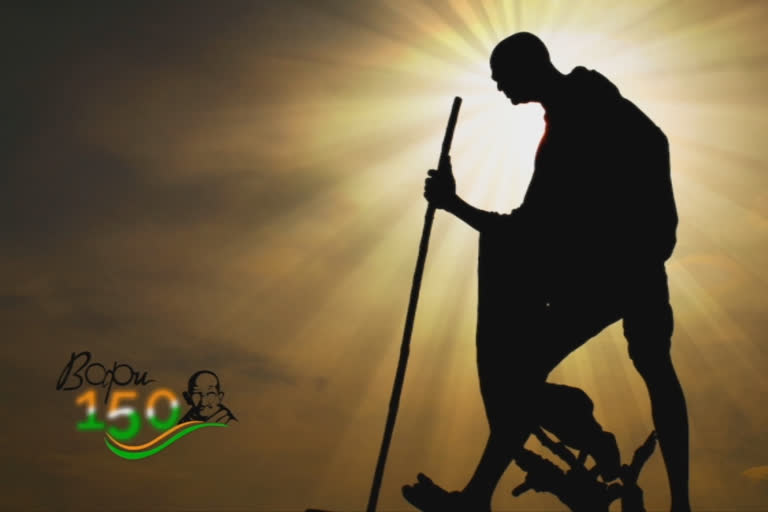Mumbai: Martin Luther King Jr, Dalai Lama, Nelson Mandela, Adolfo Perez Esquivel, the Nobel Prize Winner leaders from different continents were greatly inspired by Gandhiji’s philosophy and practice.
Nelson MandelaandDesmond Tutuplayed a major role in South Africa’s relatively peaceful transition from apartheid to a democracy that granted blacks political rights by urging the violent elements in the anti-apartheid movement to withdraw.
Martin Luther King Jr. was popularly called American Gandhi. He wrote in Pilgrimage to Nonviolence ‘As I delved deeper into the philosophy of Gandhi, my skepticism concerning the power of love gradually diminished, and I came to see for the first time that the Christian doctrine of love, operating through the Gandhian method of non-violence, is one of the most potent weapons available to an oppressed people in their struggle for freedom’. Christians generally were moved by Gandhi’s Godliness to name a few, Protestants like Stanley Jones, Henri Roser, and Dr.Corman, W W Pearson, and off course Dinbhandhu C.F. Andrews.
History shows non-violence has achieved many successes. The American Civil Rights Movement of the 1960s, led by Martin Luther King Jr. culminated in political rights for African-Americans. Communism collapsed in Eastern Europe when confronted with non-violent resistance, led by forces like Solidarity in Poland and Charter 77 in Czechoslovakia. In 1986, a massive show of people’s power toppled Ferdinand Marcos’s dictatorship in the Philippines. The army refused to fire on the people after being convinced by them-Photographs of girls offering roses to men manning the tanks are still etched in memory –to support the pro-democracy movement.
Joseph Jean Lanza Del Vasto was a scholarly Christian idealist who came to Wardha in 1937 to meet Gandhi and wrote Le Pelerinage aux sources in 1943. He became a follower, and Gandhi conferred on him an Indian name- Shantidas, or ‘servant of peace.’ Later Del Vasto became active in French politics in 1957, fasted for 20 days in protest against the torture of Algerians by the French.
In Palestine, Professor Edward Said was famous as Gaza’s Gandhi. Durban Street in South Africa is named after Gandhi. Adolfo Pérez Esquivel an Argentine activist was the founder of Peace and Justice, a pan-Latin American civil rights movement in the 1970s that adopted non-violence as its credo at a time when the continent was gripped by violent conflict.
In the year 2005, a billboard campaign displayed Gandhi working on his spinning wheel in Los Angeles, Atlanta and other US cities proving beyond doubt Gandhi’s significant impact on society at large. Atlanta based Professor Walter Earl Flukerwho visited India (2007) mentions Gandhi's great role in teaching the world about peaceful coexistence. Earlier in 1930, Gandhi was regarded in the US as ‘the man of the year’ on the basis of mileage in its newspaper headlines. InA Study of the Meaning of Non-Violence Gene Sharp writes that in 1959, “Non-Violence”, “Non-violent resistance”, “Satyagraha” and “Pacifism” were words frequently quoted in newspapers like The New York Times, The Times and The Manchester Guardian.
Back to the year 1955-56 when the Blacks of Montgomery were on a year-long non violent bus boycott (to oppose some of the barbaric customs of segregation practised in Southern US), Danilo Dolci was jailed for leading hungry Sicilians in a non-violent demonstration, Welsh Nationalists used non-violent resistance for Welsh self Government, Commander Sir Stephen King-Hall lectured to top British naval, army and air force officers on ‘The Alternative to the Nuclear Deterrent: Nonviolent Resistance’. Women of Budapest (Hungary) stopped Russian tanks by lying down in front of them.
Julius Nyerere, Tanzania’s leader was greatly influenced by Gandhi, for he sought to impose non-racialism on Tanganyika’s revolution. This was a daring piece of wisdom. Also among his most ardent students was a devout Muslim from Nigeria Aminu Kano who analysed Gandhi’s success in lifting millions of Indian to a high level of dedication and he endeavoured to adapt Gandhi’s non-violent techniques to Northern Nigeria.
The Western way of life is projected as the model to emulate resulting in the breakup of the family and the value system we had cherished for centuries. Still the Generation ‘X’ is now slowly accepting that Gandhi is relevant to India and in the contemporary world torn by violence in many patches. Gandhi is the most quoted pathfinders for today’s perplexing world in search of peace and harmony.
Also read:Gandhi, Azad and Ghaffar Khan: shared values of coexistence and tolerance
